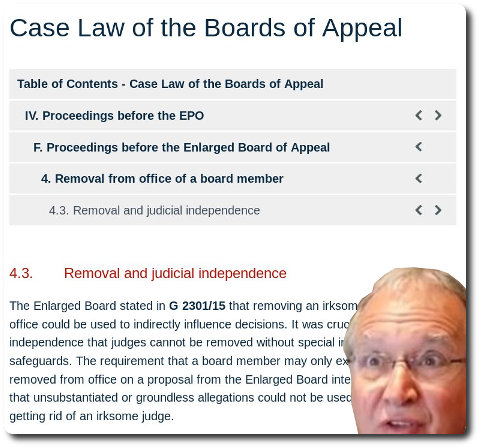

LAST night we wrote about the EPO's latest attack on the boards, which have already been relegated to the 'suburbs' of Munich (Haar). It's like Battistelli does not want these boards to exist, or wishes to overburden them to the point where they become useless for assurance of patent quality (prior art search and the like). He cannot legally knock them out of existence because of the EPC, but the EPC does not say anything about punishing them relentlessly, so Battistelli will probably get away with it. Now that his departure is almost imminent it's ever more unlikely that he'll lose his immunity and himself be subjected to disciplinary actions. 6 weeks from now he and Bergot will officially put the axe to long-term contracts. In other words, 6 months before he's gone he's totally destroying any prospects of the EPO ever recovering or salvaging the talent it once had.
Why has my comment relating to recent case re entitlement of priority at the EPO not been accepted?
Is it because I mentioned the plea of a well known specialist about the fact that the EPO should only looking whether there is identity of invention?
I considered my comment as showing that the problem is not a specific one of British courts. No more, no less.
Censorship is never good.
DG3 nominees
Dear Mr Battistelli,
On 12.08.2014 you informed staff of your decision to reduce the “administrative tasks“ performed by the members of the Boards of Appeal and of the Enlarged Board of Appeal. The administrative tasks concerned are the participation in selection boards for procedures external to DG3 and in the work of other bodies under the Service Regulations. In practice, this decision heavily affects nominations in selection boards and in the Disciplinary Committee, where the staff representation used to rely on colleagues from DG3 to provide some independence in those procedures in the past.
As to the reasons, you referred to “possible consequences resulting from the discussion” on the interlocutory decision R 19/12 by the Enlarged Board of Appeal.
As we understand it, the Enlarged Board decided in decision R 19/12 that the obligation imposed on the Vice-President DG3 (VP3), when acting as a high-ranking officer directly under the President, to consider and support efficiency and productivity goals to be reached by the Office may conflict with his duty, when acting as a member of the Enlarged Board of Appeal, to review decisions of the Boards of Appeal as an independent judge and, in so-doing, to contribute to the development of the case law as regards the protection of the procedural rights of the parties. In other words, the Enlarged Board saw in decision R 19/12 a potential conflict of interest between VP3's managerial and judicial responsibilities.
We do not see such a general potential conflict in the involvement of DG3 members in selection boards, in the Disciplinary Committee or in other bodies under the Service Regulations, essentially because DG3 members have no managerial responsibilities in other DGs.
We therefore respectfully ask to be informed why you consider decision R 19/12 to be relevant to their involvement in those tasks.
We further respectfully ask to be informed why you considered that the obligation to consult the General Consultative Committee in accordance with Article 38 ServRegs did not apply to your decision.